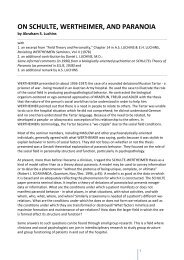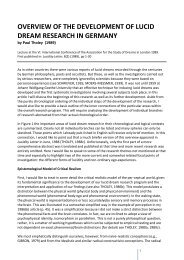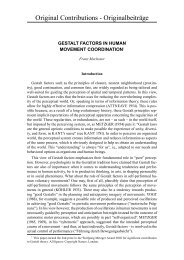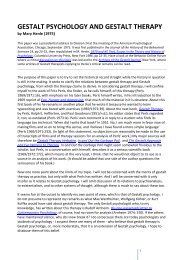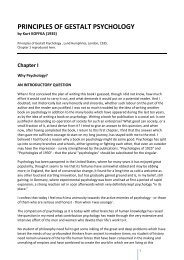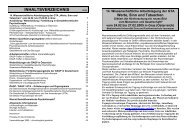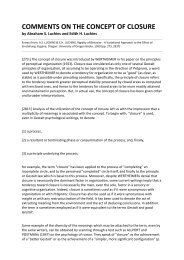pdf-Download - Society for Gestalt Theory and its Applications (GTA)
pdf-Download - Society for Gestalt Theory and its Applications (GTA)
pdf-Download - Society for Gestalt Theory and its Applications (GTA)
You also want an ePaper? Increase the reach of your titles
YUMPU automatically turns print PDFs into web optimized ePapers that Google loves.
The S-R-connections rein<strong>for</strong>ced by success-failure learning are also called hab<strong>its</strong>. Personality or<br />
character is the sum of hab<strong>its</strong>. Any of these hab<strong>its</strong> may be induced or eliminated individually<br />
without changing anything in all other hab<strong>its</strong> (vegetable bed model). From these ideas of<br />
<strong>for</strong>mation <strong>and</strong> elimination of hab<strong>its</strong> results immediately the old, traditional, but, by modern<br />
pedagogics, rejected practice of "c<strong>and</strong>y <strong>and</strong> whip". As the desirability or undesirability is<br />
determined by the educating society, the result of such an education is the maximum obtainable<br />
degree of adaptation (adjustment) or the con<strong>for</strong>mity, in other words, opportunism.<br />
11. The Principle of Reductionism<br />
There are no autochthonous psychic dynamics. All dynamics, e.g., that of learning, of thinking, of<br />
exploring, serves the purpose of decreasing organismic tensions. He, who is not hungry, does not<br />
think.<br />
12. In the area of social psychology, reductionism results in: The Principle of Primary Social<br />
Atomism<br />
There are no primary social needs <strong>and</strong> desires. They are only secondarily <strong>for</strong>med by conditioning,<br />
i.e., by the realization that certain persons are exceptionally suitable tools or means <strong>for</strong> the<br />
gratification of certain organismic needs <strong>and</strong>/or <strong>for</strong> the reduction of certain organismic tensions.<br />
In this respect, there is an unanimity between behaviurism <strong>and</strong> psychoanalysis.<br />
III. Axioms or Hypotheses?<br />
A question arises here: are the above principles axioms, i.e., necessary presumpions of any<br />
psychology, or are they hypotheses, which - in the present state of the science - would have to<br />
permit the existence of other hypotheses <strong>and</strong> eventually - perhaps even now - give way to them;<br />
in other words, are there still opposite schools in psychology ? Thus, our question is: are the above<br />
principles necessary: And, in addition, are they sufficient ?<br />
1. On the Principle of Objectivity<br />
The principle of subjectivity cannot be considered an alternative to the objectivity principle. It<br />
characterizes a historical phase of psychology which continued until the introduction of<br />
behaviourism. As the objectivity principle is a prohibition, the alternative would be a psychology<br />
without this prohibition. This alternative is realized in phenomenological psychology, in "<strong>Gestalt</strong><br />
theory" <strong>and</strong> in a number of other approaches of present psychology, <strong>and</strong> - as we shall see - it is<br />
successful.<br />
Incidentally, behaviourism <strong>its</strong>elf - even at <strong>its</strong> extremes - disregarded <strong>its</strong> own prohibition from the<br />
moment it started to speak about the "concealed", "internal", "preceding", "behaviour", meaning<br />
processes which cannot be registered by physiological means, but which are rather unequivocally<br />
identical with the acts <strong>and</strong> contents of subjective psychology. The confession of having given up a<br />
principle which played a fundamental role in the establishment declaration of behaviourism is, of<br />
course, embarrassing. However, it is even more embarrassing that this ab<strong>and</strong>onment of a basic<br />
principle not only was not confessed but rather veiled by semantic manipulations, by adding to the<br />
names of these subjective facts the suffix "behaviour".<br />
5



